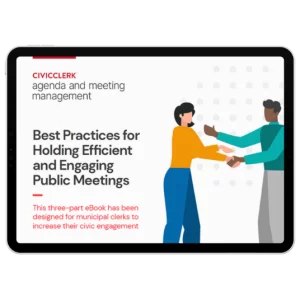Fostering and Facilitating Constructive Dialogue Across Social Divides
Actionable Advice for Leading Difficult but Critical Conversations in Your Community
The diversity of opinions, backgrounds, and experiences of your citizens creates a dynamic and valuable cultural patchwork that defines your community. There will always be topics and issues, however, that will polarize citizens with different perspectives. Municipal leaders responsible for fostering dialogue, listening to the comprehensive array of citizen sentiments, and using insights to shape public policy need to understand how to nurture and facilitate constructive dialogue that respectfully acknowledges differences and unites rather than divides the community.
Understand Tendencies that Impact Polarizing Conversations
To peaceably and effectively facilitate dialogue across divides, one must understand certain tendencies that emerge when people debate topics that cross ideological vantage points:
- Those who challenge their leaders feel passionate for or against an issue; rarely do people who feel neutral or uncertain enter debates.
- Idealists tend to think of themselves as protectors of values and their opponents as destructive, even though such beliefs are misguided, which can result in inciting and accusatory language.
- In the heat of the moment in passionate debate, participants may use slogans or buzzwords whose meanings may be vague or elicit different connotations for different people, which can further lead to confusion and misunderstandings.
- In settings where discussion is fostered or in a scenario where meeting decorum is overtaken by heated arguments, despite the formal meeting format, there is often a repetition of certain underlying beliefs among all those who want their opportunity to speak, which can flare tempers on both sides of the aisle.
Facilitating Constructive Dialogue Among Ideological Opposites
Our country was founded on a belief in freedom of speech, but when community members heatedly debate topics—in any setting—they often need a neutral moderator to help ensure the dialogue remains respectful and productive, not threatening or inciting. When moderating public dialogue, set ground rules for participants and hold attendees accountable for following them. Such policies should prohibit:
- Threatening statements.
- The use of cultural, social, gender, religious, or ethnic stereotypes or slang terminology.
- Dismissing the ideas, beliefs, or opinions of others disrespectfully.
- Offensive language.
- Interrupting speakers.
Aim to Foster Mutual Understanding
Community groups with different backgrounds, experiences, and goals may never agree with one another’s opinions, but they can learn to understand why others feel differently and can learn to accept others’ beliefs, even if they do not share them. To facilitate such feelings:
- Ask questions that help both groups realize commonalities—such as their love for their community, desire to see it thrive, or their commitment to prioritizing their family over other decisions in their lives.
- Challenge both sides not just to hear but to listen to one another. When opposing parties talk over or interrupt one another, they are not taking time to reflect on what the other person said or how they feel. Closely moderate discussion to ensure everyone who speaks has a chance to be heard.
- Rephrase what each side has said in a way that removes the emotion and focuses on the facts. By taking personal passions out of the debate and focusing on underlying goals, it can be easier to accept and understand how someone else feels.
Identify Shared Values
Through constructive dialogue, you will likely find shared values underscoring different ideas for municipal projects. For example, if one set of citizens wants to develop an abandoned factory into loft apartments and others want to turn it into a public park, what might be motivating both ideas is the desire to create a more livable downtown. By identifying that shared goal, your administration can search for proof points to determine how best to accomplish that goal, and it might even result in a compromise from both parties.

Ask Questions to Foster Collaborative Idea Generation
A critical component of moderating discussion and debate involves asking thought-provoking questions that might help a participant think about a topic from a different perspective. For example, if citizens are opposed to cutting summer camos from the local parks and rec budget, ask opposers what they would suggest as an alternative to right-size budget realities. Such questions could enable a fruitful discussion that could result in fundraising ideas or other budget compromises to offer proactive solutions rather than hostility and frustration.
Use Dialogue to Promote Healing
When events polarize a community, its members need to heal, and they need to do it in a way that allows neighbors to accept one another’s differences, share in mutual sorrow, and move forward together. Partner with a local, neutral professional to help navigate these conversations. By relying on an expert organization that has experience helping guide proactive conversations surrounding sensitive topics, such as race relations, environmental issues, or socioeconomic disparities, you can prove to your citizens that your leadership values all opinions. Facilitating such engagements may be difficult and at times, uncomfortable, but when handled with candid care and respect, it can heal divides and strengthen understanding and acceptance that is critical for current and future generations.
Acknowledge All Opinions
Everyone who speaks in any setting wants to be heard. If an attendee voices an unpopular opinion, as long they are not attacking anyone, any belief system, or classification of people, then their opinion deserves to be acknowledged. Their ideas might not help shape future actions, but recognizing their contribution to the discussion is still vital and will help others who fear they may be part of the minority sentiment feel that they are in a safe space and can contribute to the discussion.
Give Everyone Equal Time to Speak
Fostering constructive dialogue means treating all participants equally. One logistical way to show equity is to allot all speakers the same number of minutes or seconds in which to contribute. When used in formal meetings, speaker timer technology can help ensure all meeting participants can see exactly how long they have to speak and reinforces that everyone is given the same opportunity to contribute.
Also, consider distributing surveys to citizens to ensure everyone feels that they have a chance to express their opinion in a manner in which local leaders will recognize it. Surveying all citizens will help your administration ensure it is hearing from a broad spectrum of citizens, not just those who speak the loudest.
Conclusion
A democratic nation should never be without open dialogue but should always foster it in a way that shows respect. Acknowledging one another’s contributions, even if not agreeing with every opinion, is a philosophical right that public leaders should reinforce. Moderating such debates is not always easy, but it is critical to helping communities solve their greatest challenges—together.



